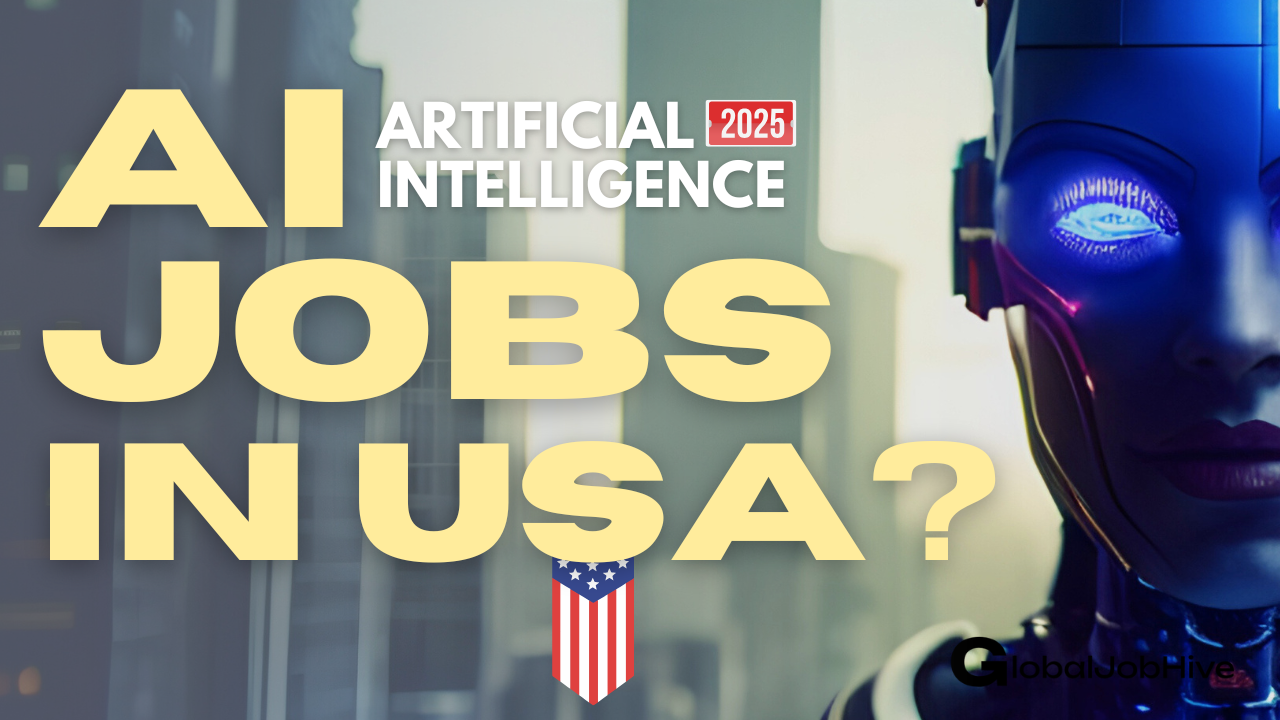The AI Revolution in the American Workforce
The artificial intelligence sector has exploded in the United States, transforming from a niche field into one of the country’s most dynamic job markets. As we move through 2025, AI has become deeply embedded across industries, creating unprecedented career opportunities for professionals with the right skills and knowledge.
Having followed this space for years, I’ve watched AI evolve from academic labs and tech giants into virtually every corner of the economy. Whether you’re considering a career pivot, advancing your existing AI expertise, or just curious about where the highest-paying opportunities lie, this comprehensive guide will help you navigate America’s AI job landscape in 2025.
Why AI Continues to Reshape the Job Market
The integration of AI technologies has accelerated dramatically, driven by several key factors:
- Competitive advantages of automation and advanced analytics
- Declining costs of implementing AI solutions
- Increasing availability of specialized AI talent
- Growing comfort with AI among business leaders
- Proven ROI from early AI implementations
Top AI Career Paths in 2025
Technical AI Roles
These positions focus on developing and implementing AI systems and require strong technical backgrounds.
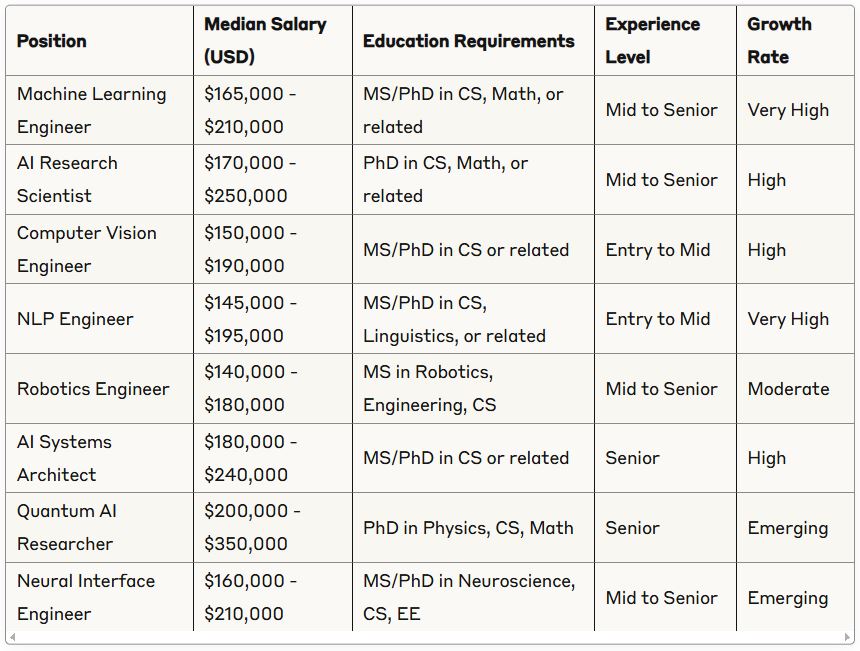
AI-Adjacent Technical Roles
These positions support AI development and implementation but may not require the same depth of AI expertise.

AI Business and Strategy Roles
These positions bridge technical AI capabilities with business applications and strategy.
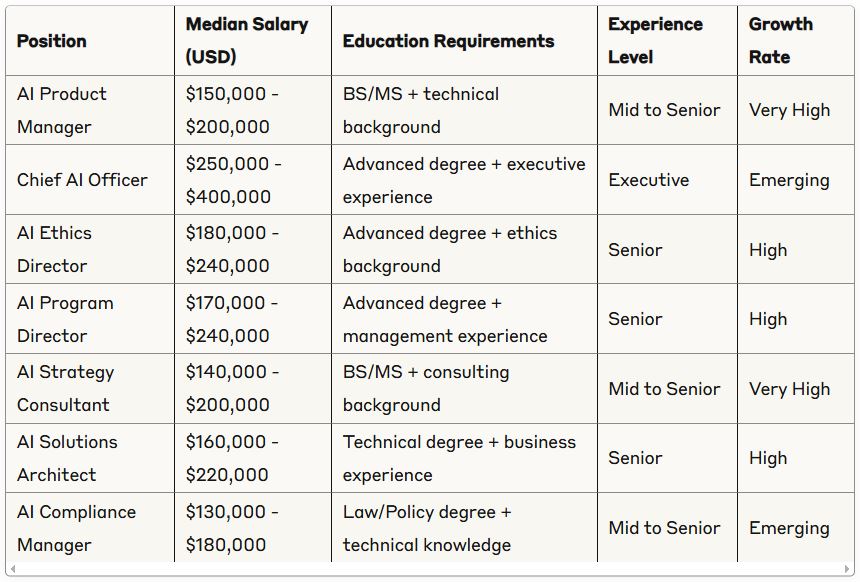
Industry-Specific AI Opportunities
Healthcare and Life Sciences
The healthcare sector has embraced AI for everything from drug discovery to clinical decision support.
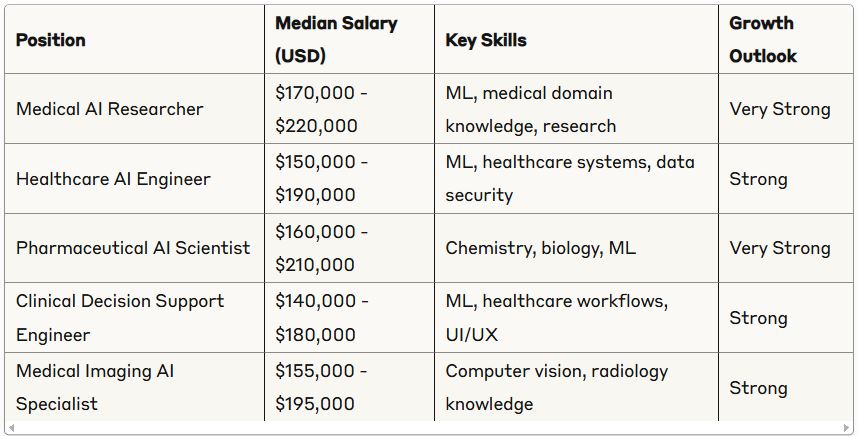
Finance and Banking
Financial institutions have aggressively adopted AI for risk assessment, fraud detection, and algorithmic trading.
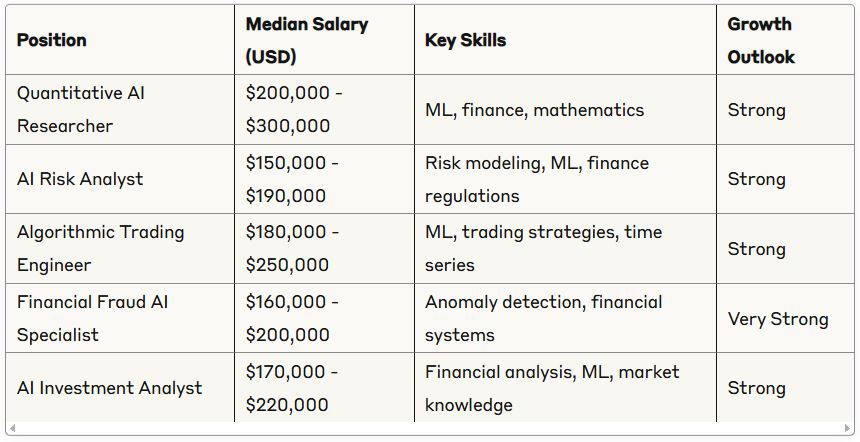
Manufacturing and Logistics
Smart factories and supply chain optimization have created specialized AI roles in traditional industries.
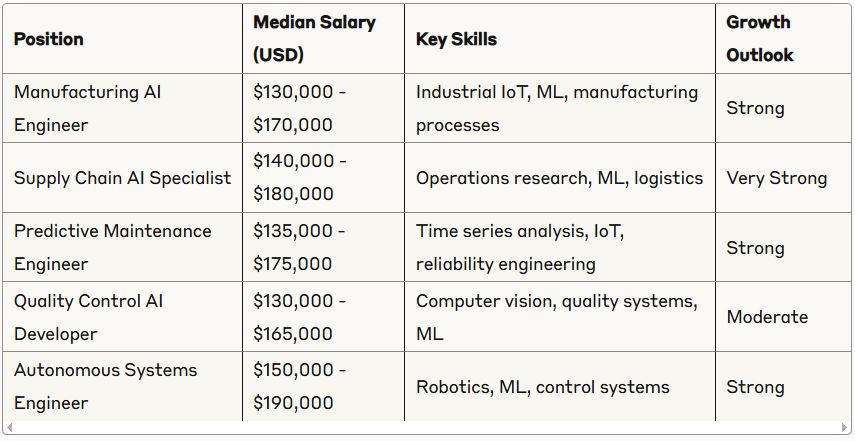
Regional AI Job Markets in the USA
Traditional Tech Hubs
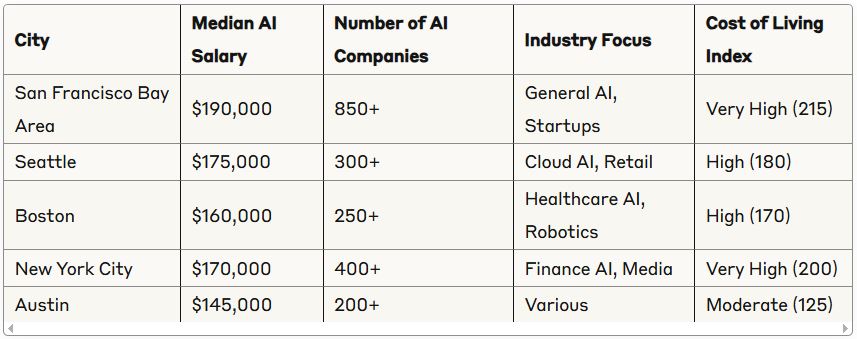
Emerging AI Centers
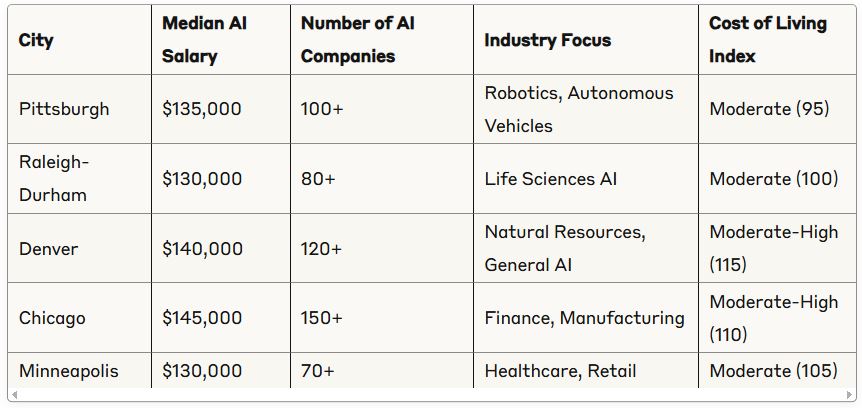
Essential Skills for AI Careers in 2025
Technical Skills by Specialization
Different AI roles require specific technical capabilities:
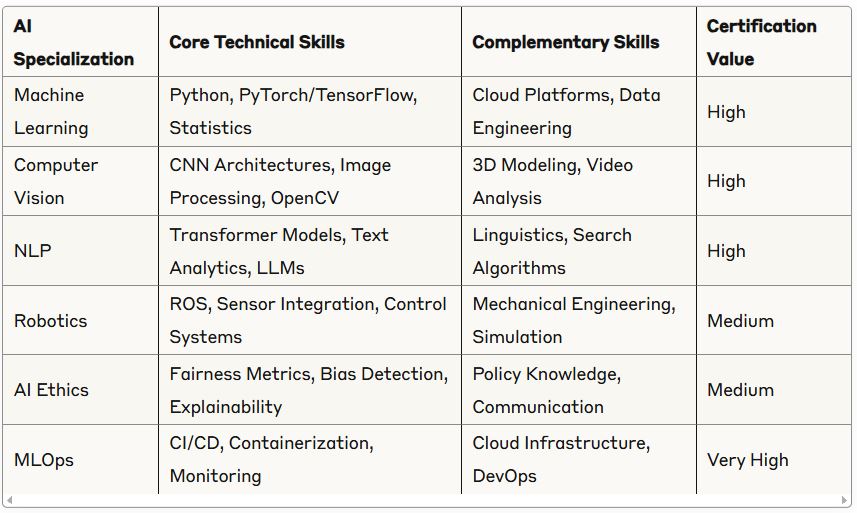
Non-Technical Skills for AI Success
Technical expertise alone isn’t enough for career advancement in AI:
- Business Domain Knowledge: Understanding the specific industry where AI is being applied
- Communication Skills: Translating complex AI concepts for non-technical stakeholders
- Project Management: Coordinating AI initiatives from concept to deployment
- Ethical Reasoning: Identifying and addressing potential harmful impacts of AI systems
- Continuous Learning: Staying current with rapidly evolving AI techniques and tools
Education and Career Paths into AI
Traditional Academic Routes
Formal education remains valuable for many AI roles:
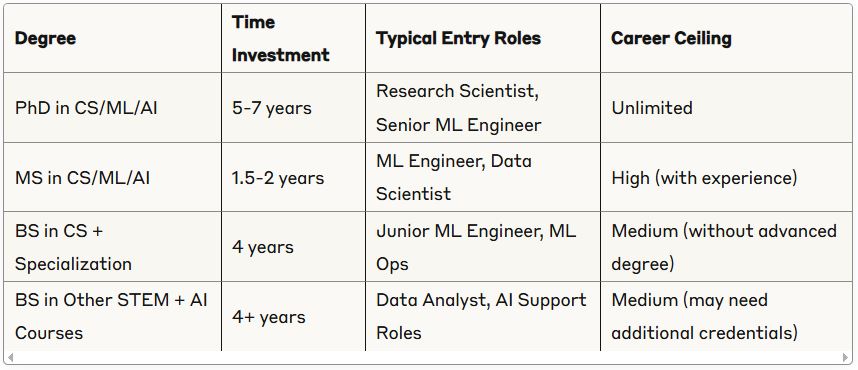
Alternative Learning Paths
Non-traditional routes into AI have become increasingly viable:
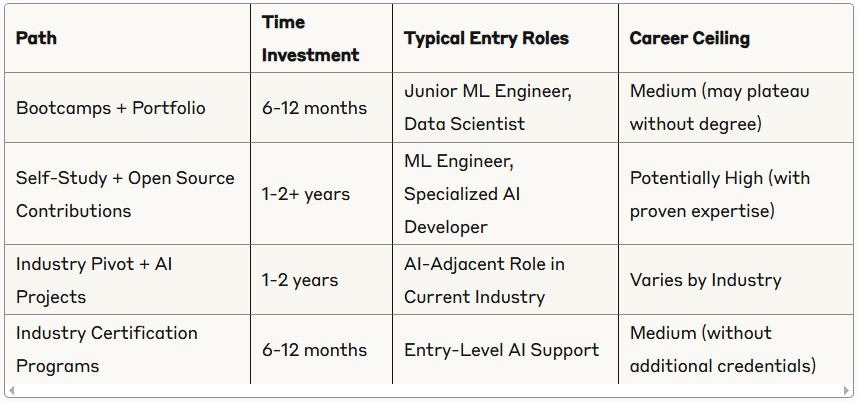
Workplace Trends in AI Jobs
Remote Work Patterns
The AI job market has embraced flexible work arrangements:

Company Types and Work Culture
Work experiences vary significantly across different types of organizations:
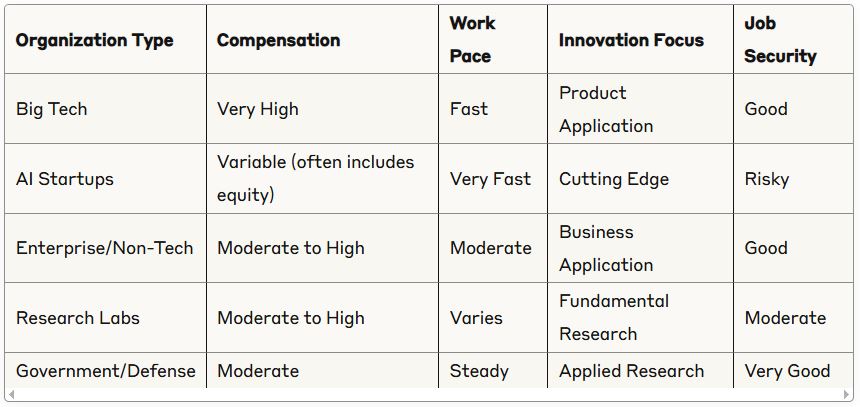
Preparing for AI Job Applications
Resume and Portfolio Optimization
Standing out in the competitive AI job market requires strategic presentation:
- GitHub Portfolio: Maintain well-documented projects demonstrating key AI skills
- Technical Blog: Share insights and learnings from personal projects
- Contribution to Open Source: Participate in relevant AI open source projects
- Research Publications: For academic roles, peer-reviewed publications are valuable
- Domain-Specific Projects: Demonstrate AI applications in your target industry
Interview Preparation
AI job interviews typically assess multiple dimensions:
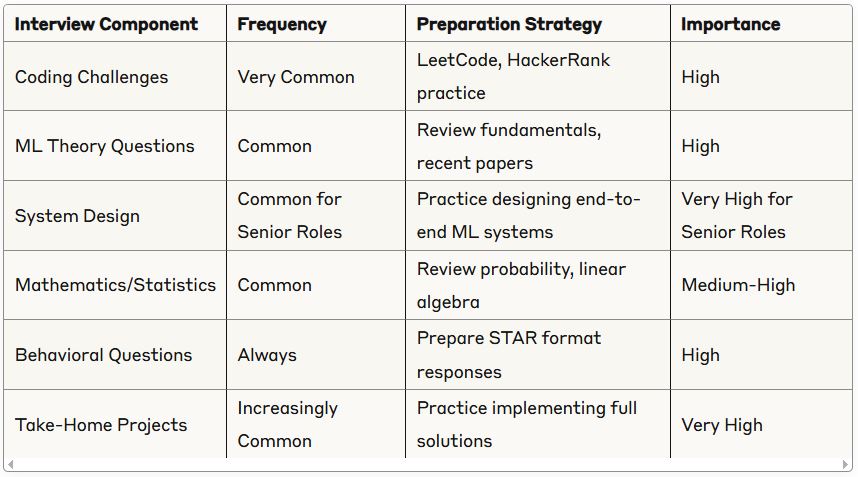
Emerging AI Specialties to Watch
Rising AI Career Niches
Several specialized AI areas are showing rapid growth:
- Generative AI Engineers: Developing and fine-tuning systems for content creation
- AI Governance Specialists: Ensuring responsible AI use within organizations
- AI Sustainability Experts: Optimizing AI systems for energy efficiency and environmental impact
- AI Experience Designers: Creating intuitive human-AI interaction systems
- AI-Human Teaming Specialists: Designing workflows where humans and AI collaborate effectively
- Neuro-Symbolic AI Researchers: Combining neural networks with symbolic reasoning approaches
- AI Prompt Engineers: Specializing in optimal prompting strategies for foundation models
Challenges and Ethical Considerations
Navigating AI Career Dilemmas
AI professionals often face unique ethical challenges:
- Algorithmic Bias: Ensuring AI systems don’t perpetuate or amplify societal biases
- Privacy Concerns: Balancing data needs with privacy protection
- Automation Impact: Contributing to technologies that may displace certain jobs
- Dual-Use Technologies: Creating systems that could be repurposed for harmful applications
- Transparency Limitations: Working with inherently complex, sometimes unexplainable systems
FAQs About AI Jobs in the USA
Do I need a PhD to work in artificial intelligence?
No. Research positions typically require PhDs, but many applied roles are accessible with bachelor’s or master’s degrees plus relevant experience.
Which industries are hiring the most AI professionals?
Healthcare, finance, technology, retail, and manufacturing, with healthcare showing the fastest growth in 2025.
How much experience do I need for entry-level AI jobs?
Demonstrated skills through 3-5 relevant projects or internships, even without formal work experience.
What programming languages are most important for AI jobs?
Python is dominant (90% of listings), followed by SQL, Java/C++, and frameworks like PyTorch and TensorFlow.
How can I transition from software engineering to AI?
Take structured online courses, contribute to AI projects at work, build a personal portfolio, and consider specialized education.
What’s the salary difference between AI jobs and traditional software roles?
AI specialists earn approximately 20-40% more than comparable software engineering roles in 2025.
Are AI jobs at risk of being automated themselves?
Lower-level tasks are increasingly automated, but strategic, creative, and research-oriented AI roles remain secure.
How important are AI ethics skills for job seekers?
Very important. By 2025, over 65% of senior AI roles require demonstrated experience with responsible AI practices.
Was this article helpful?
- Yes, this information was valuable
- Somewhat helpful, but I need more specific details
- No, I was looking for different information
Please share your feedback to help us improve our content!
External Resources
- Bureau of Labor Statistics – Computer and Information Technology Occupations
- AI Ethics Guidelines – IEEE
- National AI Initiative Office
- AI Career Pathways – AI4ALL
You might like this: Freelancing in 2025, Top Earning Fields in the USA
